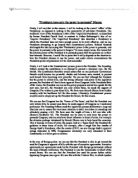How far does the President only have the power to persuade?
The President is often cited as being the most powerful man on earth, yet as this essay will explore that may be more due to his country’s power and influence than that of his specific position. Presidents use the “power to persuade” as a means of exerting their influence on the way the country is run, thus why a strong and charismatic personality is key. The power to persuade is no specific “power” per say, but is often typified by Presidents indirectly pushing through their own legislation through Congress (the sole federal legislative body) by convincing, or persuading Congressmen to follow their line. Great examples include LBJ persuading the Senate to reject a filibuster and make into law the Civil Right Act proposed by JFK before he was assassinated. Other Presidents, such as Reagan used speeches to mass support, for example after he survived an assassination attempt in 1981 he used his national address to capitalise on a general feeling of sympathy. There are also numerous positions close to the President, for example the heads of Department present in the Cabinet who the president can persuade into working in a way he likes.
It is easy to see why some view the Presidents only real power as that to persuade. The Separation of Powers in the US of the Executive (President and his staff), the Legislative (Congress) and the Judiciary mean the President actually has very little control over the other quite substantial and important branches of Government. In fact the President is only even aloud into Congress once a year during the State of the Union address. Unlike in the UK the largest party in Congress not only not guaranteed to be loyal to the presidents but can even be a completely different party, as is currently with a democratic President and a Republican dominated House of Representatives. Interestingly enough it is situations like this when the powers of the President are even more limited, and so he must increasingly rely on his ability to persuade. The need for Bipartisan support and work is especially apparent during the current sitting of Congress, where Obama must try to work, to persuade, both parties in Congress to work together and formulate a compromise in the nation’s interest. The President actually has very little direct influence over the way the country is run and the laws that are made, as they belong to Congress, which as explained it outside of the Presidents direct control. The power of the purse, effectively the control over the massive US budgets is a power of Congress not the President, and thus the Presidents only real method of influencing how this is spent is by influencing the heads of department’s decisions, most of whom will be present in his Cabinet. In Obama’s case he even invited key sympathetic Republican Congressmen onto AirForceOne to try and convince them to support his healthcare bill. Increasingly Congress has been limiting the powers of the President even more. After Nixon’s bombing of Cambodia the War Powers Act meant only Congress could formally declare war, a power once held by the President. As a result the president must now persuade Congress over to his thinking if he wishes to declare a war that requires more than the few thousand “advisors” he can currently send without Congressional approval. The same is true for the ratification of treaties and appointments. While the President can sign treaties and nominate appointments for positions like the Supreme court it is still Congress who must approve these, and so Presidents must win over the support of people in the position to do so. For example the President had to hold many meetings with the Senate Defence committee before they voted to support the most recent incarnation of the START treaties with Russia, and even then the margin of victory was minimal.







